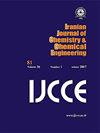Surface Fluorinated Microsized-TiO2 for Formulation of Self-Cleaning Cement
IF 1.3
4区 工程技术
Q4 CHEMISTRY, MULTIDISCIPLINARY
Iranian Journal of Chemistry & Chemical Engineering-international English Edition
Pub Date : 2021-08-07
DOI:10.30492/IJCCE.2021.525826.4596
引用次数: 0
Abstract
The use of nanosized-Titanium dioxide (n-TiO2) for the formulation of self-cleaning cement has the associated drawbacks of nano-toxicity, higher cost and agglomeration in the cementitious material. These drawbacks can be avoided by the replacement of n-TiO2 with microsized-TiO2 (m-TiO2). However, m-TiO2 is less photocatalytically active as compared to n-TiO2 . Therefore, in the present work, surface fluorination of m-TiO2 has been studied to enhance its photocatlytic activity for the formulation of self-cleaning white cement. The commercially available m-TiO2 (average size 40 μm) was surface fluorinated using aqueous solutions of different molar concentrations of NaF (sodium fluoride) such as 10, 50, and 100 mmol dm-3. The surface fluorinated m-TiO2 was analyzed using diffuse reflectance spectroscopy (DRS), photoluminescence spectroscopy (PL) and X-ray diffraction (XRD) analysis to observe the improvement in the physiochemical properties and photocatalytic characteristics. Further, the surface fluorinated m-TiO2 along with calcined dolomite was utilized for the formulation of self-cleaning white cement. The hence prepared self-cleaning cement was cast into cement slabs, which were then characterized by diffuse reflectance spectroscopy (DRS) and energy dispersive spectroscopy (EDS). The self-cleaning ability and photocatalytic activity of the as prepared cement slabs were evaluated through Rhodamine B (RhB) degradation test. It has been found that the use m-TiO2, which was surface fluorinated using 10 mmol dm-3 solution of NaF, remarkably enhanced the photocatalytic performance of the self-cleaning cement.表面氟化微粒径二氧化钛制备自洁水泥
使用纳米级二氧化钛(n-TiO2)制备自洁水泥存在纳米毒性、成本高和胶凝材料团聚等缺点。这些缺点可以通过用微米级tio2 (m-TiO2)代替n-TiO2来避免。然而,与n-TiO2相比,m-TiO2的光催化活性较低。因此,本文研究了m-TiO2的表面氟化,以增强其光催化活性,用于自洁白水泥的配制。采用不同摩尔浓度的NaF(氟化钠)溶液(如10、50和100 mmol dm-3)对市售m-TiO2(平均尺寸为40 μm)进行表面氟化处理。采用漫反射光谱(DRS)、光致发光光谱(PL)和x射线衍射(XRD)对表面氟化的m-TiO2进行分析,观察其理化性能和光催化性能的改善。进一步,利用表面氟化的m-TiO2和煅烧白云石制备自洁白水泥。将制备的自洁水泥浇筑在水泥板上,利用漫反射光谱(DRS)和能量色散光谱(EDS)对水泥板进行表征。通过罗丹明B (Rhodamine B, RhB)降解试验,对所制备的水泥板的自清洁能力和光催化活性进行了评价。研究发现,使用10 mmol dm-3 NaF溶液表面氟化的m-TiO2可显著提高自洁水泥的光催化性能。
本文章由计算机程序翻译,如有差异,请以英文原文为准。
求助全文
约1分钟内获得全文
求助全文
来源期刊

Iranian Journal of Chemistry & Chemical Engineering-international English Edition
CHEMISTRY, MULTIDISCIPLINARY-ENGINEERING, CHEMICAL
CiteScore
2.80
自引率
22.20%
发文量
0
审稿时长
6-12 weeks
期刊介绍:
The aim of the Iranian Journal of Chemistry and Chemical Engineering is to foster the growth of educational, scientific and Industrial Research activities among chemists and chemical engineers and to provide a medium for mutual communication and relations between Iranian academia and the industry on the one hand, and the world the scientific community on the other.
 求助内容:
求助内容: 应助结果提醒方式:
应助结果提醒方式:


